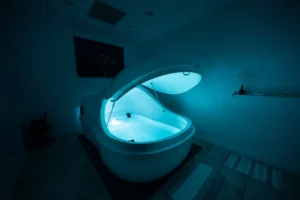In a world that constantly demands innovation and creativity, finding ways to break through mental barriers and access new levels of cognitive performance is more important than ever. Among the myriad of methods explored, float therapy stands out as not just a means of relaxation, but as a gateway to unlocking the untapped potential of the mind. This article delves into the fascinating research surrounding float therapy and its profound impact on enhancing creativity and cognitive function.

The Floating Catalyst for Creativity
Float therapy, or sensory deprivation therapy, offers a unique environment where the mind is freed from the constant bombardment of sensory input. This absence of external distractions allows the brain to enter a state conducive to creative thinking. Research in the Journal of Creativity in Mental Health highlights how individuals who engage in float therapy report significant increases in creativity, problem-solving abilities, and innovation.
The Science Behind the Silence
The science of float therapy’s impact on creativity lies in its ability to alter brain wave patterns. During a float session, the brain transitions from its usual beta state, associated with day-to-day alertness, to theta waves, which are most commonly found in the stages between wakefulness and sleep. Theta waves are associated with deep relaxation, meditation, and heightened creativity. Studies suggest that the theta state, facilitated by float therapy, can enhance brainstorming abilities and foster a creative incubation period that is difficult to achieve in a standard environment.
Cognitive Clarity and Enhanced Focus
Beyond its effects on creativity, float therapy has been shown to improve cognitive function and focus. The International Journal of Neuroscience published findings indicating that participants exhibited better concentration and heightened mental clarity following float therapy sessions. This enhanced focus can be attributed to the reduction of cortisol levels and the minimization of stress, allowing the brain to function more efficiently.
The Role of Float Therapy in Problem-Solving
One of the most compelling aspects of float therapy is its ability to enhance problem-solving skills. By providing a distraction-free environment, individuals can ponder complex issues or generate new ideas without the usual mental noise that inhibits clear thinking. Research demonstrates that this deep contemplative state can lead to breakthroughs and innovative solutions that seemed elusive under normal circumstances.
Empirical Evidence and Personal Testimonies
The benefits of float therapy on creativity and cognitive function are not just supported by empirical research but are also reinforced by the experiences of artists, writers, entrepreneurs, and thinkers who have turned to floatation as a tool for cognitive enhancement. Many report experiencing a surge in creative output and a newfound clarity of thought post-float, illustrating the practical impacts of these sessions on intellectual and creative pursuits.
Conclusion: A Journey into the Mind’s Depths
As we continue to explore the vast capabilities of the human mind, float therapy emerges as a powerful ally in the quest for creativity and cognitive enhancement. Its ability to foster a state of deep relaxation, combined with the neurological shift towards theta wave production, offers a unique pathway to unlocking the mind’s latent potential. In the silence and solitude of the float tank, we find not just a retreat from the world but a deeper immersion into the uncharted territories of our own minds, where the seeds of innovation and insight await discovery.






